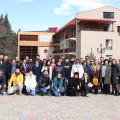The third article of the PEN Charter mentions peace, good understanding between nations, and respect. How realistic is this after the war?
In Europe I’ve seen a close friendship between two girls – Bosnian and Serb. They would hug each other every day. During the war in Bosnia in the 1990s, around fifty thousand Bosnian women were raped by Serb forces. But now, those Serb and Bosnian girls were hugging each other. When I asked what language they spoke with each other, the reply was, “I speak Bosnian, she speaks Serbian, but we understand each other.” Of course, I think that there is a possibility of good relations with our neighboring states, but not right now, in these conditions and the current situation. We have been hit not just by one state, but by three at the very least. We need to regain a sense of justice, at least in part, in order for there to be good relations with our neighbors. Azerbaijan must be held accountable as a state for the massacres and periodic targeting of border villages, as well as for war crimes and the prisoners they are still holding. That needs to happen in a legal setting, in international courts. Azerbaijan must have started an active campaign abroad after the war to clear its name. They displayed a poster in the London Underground claiming to be a center of multiculturalism. They lit candles on the banks of the Danube in Budapest and left notes about Khojalu, urging people not to remain silent, to prevent the outbreak of another war, and so on. Naturally, such behavior and impunity for this state reinforce our sense of injustice and mutual hate. They started the war and now themselves pursue a campaign for urging an invisible audience to prevent another war, I perceive this as the opposite message – it means that they have not yet given up on their plans for war. And impunity for them might lead to yet another war.
Good relations with neighbors are a necessity for sure, this is a guarantee of peace, above all else. Our generation does not know what real peace is. We don’t know what this is. I don’t know what this is. Even in the twenty-first century, we have seen people whose heads were severed from their shoulders. In both Armenia and Georgia, war has been a constant threat looming over people’s heads. When I jumped up from bed in 2008 from the bomb that was dropped by Russia on the military base near our house, and the shuddering of the glass got under my skin, I realized that I was nothing, that I could vanish in an instant, obliterated by a bomb dropped on the orders of someone. We have always lived in an imitation of peace. We have played the game of peace the way that children play pretend. No good relations developed between our neighbors and us precisely because of that illusion of peace. This failure happened because these issues were not taken to a legal setting at the right time. German, British, and Austrian young people live in real peace today, because their state took care of that peace and guaranteed it for their citizens a long time ago. That peace has grown into a sustainable and absolute time and space, thanks to their state.
Your generation bore witness to a war, victory, then another war, and defeat. How will all this be reflected in our literature, in your opinion, so that they can present the complete picture of these times in which we are living?
One generation witnessed all this, while the other saw only the last part, and yet another saw just the period between the wars. The image of these times through which we are living is full of interruptions, it keeps breaking up. We are not living these times; we are only living from time to time. Do we know what the previous times were for, who they were for, and why everything happened that way? In order to get the full picture, we have to position ourselves within the context of the world, and we need to identify our ties with the rest of the world. . I said a minute ago that the European states have guaranteed peace for their citizens. During the war, I had not expected my foreign friends to write to me and ask about Armenia. Peace is probably like a space where you have no idea what’s going on beyond its borders. You have no perception of it all, it seems so far away, just like the hurricanes that hit the American coast, the fires or tremendous rainfall that engulfs tropical forests. It is just another conflict or a small war, something buried in articles with vague headlines, another war among the many that have raised smoke in various dark corners of the planet, in the part that has been named as the Third World , which sounds like a verdict. Armenia has never seemed so much like an open wound. That wound opened up a long time ago and kept splitting wider. Now more than ever, I can see the various issues that have built up, and which have now grown more profound and acute after the war. There was some progress on work done with society before the war, and it was possible to have discourse of some sort, an internal dialogue was beginning to take shape; now, all of that seems to be down the drain. Perhaps these are the issues that need to be brought to the surface and reflected in our literature, the literature itself can become a free platform where these things can be discussed and these problems can be brought forth. The connection between the old and the new may end up being at the core of the literature. After the war, in Budapest, I was walking past the ruins of a second century amphitheater one day. There was a square in the middle and the rocks remaining from the foundation of the amphitheater surrounded it. When I walked past, I saw a woman taking her dog for a walk there, in that central space. You would think that it was an important historic monument and they needed to protect it before it disappeared underground for good, but there was a woman walking her dog on a leash, absolutely calm and in no hurry whatsoever. Under the sun in today’s sky, among the ruins of the second century. Recalling that image always gives me peace, but I don’t understand why.
Can writers use their words and their pens to start and succeed with a peace initiative? Will their words be understood and accepted?
Anything that a writer says will be understood and accepted if it does not contain hate. Hate should not have a place within us at all. We have to differentiate between the people and the state, the people manipulated by the state and the state that manipulates them, and we have to see that hate is the very tool that is used for this. Anything a writer says will be understood and accepted if it is free of hate. Society does not expect words of hate from a writer. Even if the reader speaks in a language of hate, they are the first person that would not want to hear the same in the words of a writer. They do not seek a writer to read words of hate They expect healthy and human-centered words from writers, because hate does not make one stronger, and what they seek from literature is strength. Hate speech often has the people of our neighboring states as its target. We need to understand where the state ends and where regular human beings begin. I don’t want my hate to go beyond the point where human beings begin. As for states—whether it is our own or another’s—they have this face today, but they could be completely different tomorrow. Years ago, when I was a student in Budapest, I used to live at the university hostel. There were some guys from Azerbaijan living on my floor and the one above me. I would make sure I always locked my door. I would check before sleeping to make sure it was locked. Recently, during the war, I recalled with surprise that I had never told this story to my Georgian or European friends. Perhaps I had subconsciously understood that this would seem weird to them at the very least – why would someone be afraid in the twenty-first century that he could be hacked by an ax in his sleep? On one occasion, I went to the pub for a drink with one of the Azerbaijani guys from my hostel. When we returned, I locked my door through sheer force of habit, and I turned the knob several times to make sure it was locked. That was where the human being ended—right there on that threshold—and the state began. I did not lock my door to keep out that human being, but to protect myself from his state, because that state had given a hero’s welcome to the man that had hacked an Armenian to death with an ax in Budapest, and had rewarded him with an apartment. Perhaps that Azerbaijani had also locked his door. Perhaps he had also always made sure that his door was locked.
When will these doors open?



